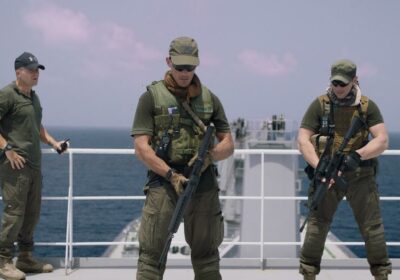‘Dogwatch’ Explores Toxic Masculinity and Absurdity of War With Humor and Style

Vying for the top prize at Swiss international doc film festival Visions du Réel, Gregoris Rentis’ debut feature “Dogwatch” is a stunning, stylized triptych that follows the stories of mercenaries Yorgos, Costa and Victor.
All three work as private guards hired by ships crossing the so-called High Risk Area of the Somali coastline to protect their cargo from pirates. But what was a necessity in the late 2000s no longer makes sense a decade later due to the steady drop in attacks from pirates.
The resulting absurdity of their ongoing training and presence on land and at sea transpires through this film laced with slapstick comedy moments infused with hyper-charged masculinity.
Variety caught up with Rentis, who explained that his doc was seven years in the making as he faced the challenge of finding a shipping company willing to allow them onboard, getting the go ahead from maritime security and casting his characters. His inspiration came from his uncle, Victor, one of the first privately hired mercenaries in the region.
“The first spark was trying to understand his life. The mercenaries live on the frontier, they don’t conform to society, so this kind of business is a way out. It’s hard for them to connect with life on land,” he explained. “Initially, these guys went into this sector for a number of reasons: the money was good but I think it was more for the prestige, the ability to tell their stories, a job that sounds cool.”
While he said it was important for him to highlight the slapstick element in this action world, what intrigued him was its “machismo” and exploring the imagery of the male body. “To me it’s a film that addresses the question of what it means to be a man today, this idea of having to be the strong guy with muscles and tattoos and the biggest gun: it’s absurd,” he said, comparing it to playing war when he was a child.
Only two female characters – the mercenaries’ partners – appear briefly in this male dominated doc, but “it was very important for me to have a female presence,” said Rentis, “it anchors the film; it starts the film and ends it.”
Rentis drew from his background in advertising to give the doc its clear structure and polished look. Editor Chronis Theocharis (“Golden Dawn: A Public Affair”) brought “the perspective and calmness that was necessary,” he said. “I introduced a set of rules for myself – a kind of manifesto on how to shoot a scene – because I knew I was going to have to make decisions on the spot and create unity between the different parts of the film. So I wanted to have a camera on a tripod, to be centrally framed, so that this idea of toxic masculinity would come across in a more profound way,” he said.
While some scenes show fly-on-the-wall intimate moments with the mercenaries and their families on land, others are reconstructions prompted by the director. “In my mind [the characters] are co-authors: I would see them do something and we would recreate it together, like the drills, for example. I would ask them to show me how they prepared and they would take me through the stress tests,” he said, adding that he drew much of his inspiration from action movie mythology.
“They would say very openly, ‘We love ‘The Terminator.’ ‘ My uncle said his dream was to be the bad guy in a movie, and when the good guy would kill him, the whole cinema would cheer.”
His goal, however, was not to mock or criticize the industry but to show its human side. “What really struck me from the start was that they all told me that if they were Somali, they would be pirates: they empathized with the other side, there was this mirror effect: one could not exist without the other.”
He said he sees his film as a cautionary tale of Western society’s goal-oriented obsession: “These people are defined by a cause – some kind of external justification for what they do – but while we are busy proving ourselves to the outside world, real life passes us by, and when we return after many trips, adventures and months away, in the end what do we gain from it?”
Rentis is currently working on his next project, a fiction feature film about the sexual abuse scandal in the Greek gymnastics Olympic team inspired by the Larry Nassar case, entitled “Sydney.” Shooting is due to start in 2023.
“Dogwatch” is produced by Rentis’ Byrd outfit, Vicky Miha’s production company Asterisk and Clément Duboin’s Paris-based Good Fortune Films, in co-production with Topcut Modiano and Arctos S.A., with the support of Eurimages, the CNC’s Aide aux cinémas du monde, the Greek Film Center, Creative Europe Media, the Greek Film Centre, ERT and ARTE.
A former VdR-Pitching and Les Arcs Work in Progress entry, the film world premiered at Visions du Réel on April 10 in the main International Feature Film competition. Winner will be announced on April 16. The film fest runs through April 17.
Source: Read Full Article